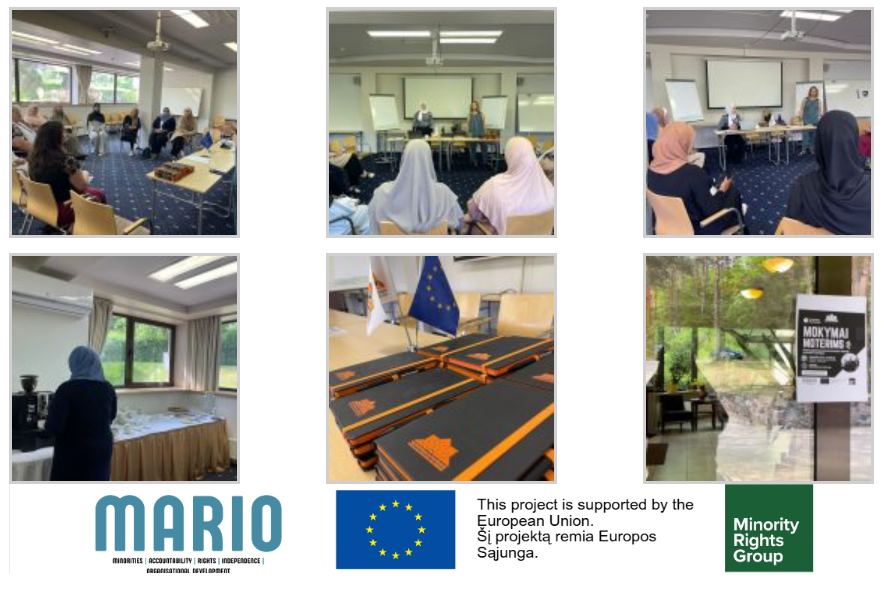First joint training on women's empowerment in community activities

The Lithuanian government officially recognized Islam (Muslims-Sunni) as a traditional religion, equal to other faiths in Lithuania. However, minimal efforts are made to protect the rights of this religious community. The community is often left on its own to find solutions and resources to nurture its activities, including the preservation and maintenance of historical religious buildings, such as mosques, of which only a few remain throughout Lithuania. It is worth noting that due to political difficulties, this community has been denied permission to build a modern mosque in Vilnius for many years, replacing the one destroyed during the Soviet era. This decision once again shows the inability to grant freedom to this ethnic minority and allow them to nurture their national and religious needs. As a result, Lithuanian society loses the opportunity to familiarize itself with the cultural and religious environment of this community and to combat discrimination against them.
The non-governmental organization "Education and Heritage" (in Lithuanian: Viešoji įstaiga „Švietimas ir paveldas“) in collaboration with the Muslim communities in Vilnius and Kaunas, is working together to ensure the respect of the rights of these minorities, as outlined in the Council of Europe's Framework Convention for the Protection of National Minorities. This convention upholds the importance of preserving the rights and freedoms of national minorities, combating discrimination, ensuring equality before the law, and safeguarding and promoting the cultural identity of these minorities, including their language, religion, traditions and cultural heritage. It also emphasizes the right to education, freedom of expression in their mother tongue and active participation in public life. Representatives of these minority communities have the same rights as other minorities in Lithuania, allowing them to freely express their cultural and religious traditions, including the preservation and nurturing of their cultural, religious, and ethical values.
To promote the integration of these national minorities into society and foster intercultural and interreligious dialogue, training sessions were organized for women on May 25th, in collaboration with the Minority Rights Group and PILnet. The aim of these training sessions, titled "Empowering Women in the Community: their rights and responsibilities" was to reduce gaps, fears, and intolerance among representatives of different faiths and cultures in Lithuania. During the training, the importance of women being aware of their rights and responsibilities within the family and the community was discussed, with a particular focus on promoting education, economic independence and active participation in social activities.
The goal of this training was to empower women to become leaders in their communities, build self-confidence and contribute to the well-being of society. Participants shared their personal stories and success examples, emphasizing the importance of collaboration.
During the training, the focus was on examining the obstacles faced by women, methods of reducing stress and nurturing positive emotions. One of the sessions was led by health and well-being specialist Vaida Vaižmužytė, who is a certified clinical hypnotherapist. During the session, participants were able to openly discuss their strengths and weaknesses, fears and emotions, encouraging and seeking common solutions.
During the training, the topic of "Reputation with or without religion" was discussed, led by lecturer Ieva Vasiliauskienė. Participants learned important things about the importance of reputation and the responsibilities associated with their roles. It was mentioned that these aspects are essential in planning responsible duties and activities within the Islamic religion. Ieva Vasiliauskienė is an experienced lecturer in personal and professional development, with a strong emphasis on ethical behavior and responsibility.
The training concluded with a discussion on the role of successful volunteering in the community, presented by Fatima Laurita, a volunteer from the Kaunas Muslims Community Weekend School "Minaretas," and Nelli Mazitova, projects manager of NGO "Education and Heritage." It was emphasized that volunteering is an incredibly important action within the community, as it allows women to not only participate in their religious ceremonies but also support their local community, personally grow within it, and make a positive social impact. "Volunteering strengthens community bonds and promotes societal values such as empathy and serving others," noted Nelli.
During the training, women easily engaged in discussions and open conversations in a friendly and welcoming environment, expressing their needs and ideas. It was expressed that women's participation in community activities can serve as a positive example and encourage young girls to contribute to similar volunteer work, engage in meaningful activities, receive helpful advice on combating poverty, take care of their health, promote justice and equality, and receive support in pursuing higher education or professional advancement.
The training on "Empowering Women in the Community Activities: their rights and responsibilities" is part of the MARIO program, supported by the European Union in collaboration with the Minority Rights Group and PILnet.